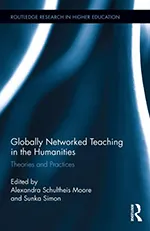Building a Borderless Class

A new critical anthology on globally networked teaching features a course taught by Associate Provost and Professor of German and Film and Media Studies Sunka Simon, Associate Professor of French Carina Yervasi, and Ashesi University Professor Mikelle Antoine.
Co-written by Simon and Yervasi, an article on their course Re-Envisioning Diaspora is included in Globally Networked Teaching in the Humanities: Theories and Practices, published last month by Routledge and co-edited by Simon. The course, which is featured as an example of a "globally-networked learning environment," was the first hybrid course taught in synchronous time between Swarthmore and Ashesi University in Ghana.
Taught to students on both continents, the course explored questions of nationality, globalization, race and ethnicity, and gender and sexuality through the unique lens of global diasporic communities. The syllabus focused on how displaced peoples worldwide confront these difficult questions while living in a perpetual state of "elsewhere."
According to Antoine, the course provided students with the educational opportunity to truly engage in global citizenship. "A globally networked classroom is one that gives students a chance to be active on the global stage, see themselves as members and participants of that stage," she says, "and not just reduced to the classroom, but rather have them think of their learning as part of a bigger project for cultural development."



